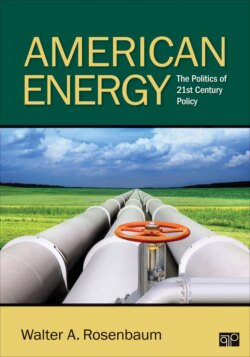Читать книгу American Energy - Walter A. Rosenbaum - Страница 22
На сайте Литреса книга снята с продажи.
The Economy
ОглавлениеIf energy seldom earns a mention among public issue concerns, the economy seldom fails to get attention—lots of it. Since 2009, opinion polls have shown that the public has almost always rated the economy the most important national issue.41 In fact, energy and the economy are inseparably related. The nation’s energy markets are deeply embedded in the larger setting of national and international economics. Energy markets respond, often rapidly, to macro- and microeconomic events and, in turn, constitute a powerful influence upon domestic and global economic affairs. This profound interdependence between energy markets and their broader national and international setting affects the domestic energy economy in several significant respects.
One characteristic of the domestic energy economy is the interdependence of market supply, price, and demand among major energy sources. Domestic energy prices, supply, and demand characteristically fluctuate as the market status of one or another source alters.
Another potent influence upon energy development is the availability of investment capital. The domestic commercial nuclear power industry has required large infusions of capital from both private business and federal government to evolve and survive. Renewable energy sources, such as wind, solar, geothermal, and biomass, have historically depended largely for their development upon federal subsidies, tax incentives, and R&D funding. Even so, wind farms, especially, require so much space for giant wind turbines that they often depend upon banks to finance 50 percent of the project cost. And corporate planning for future energy development is usually contingent upon the availability of new capital.42
Energy policy also reacts with acute sensitivity not only to changes in existing supply but also to estimates of future energy availability. While concern over future global crude oil reserves has haunted all national energy policy discourse for many decades, a more recent, if less widely publicized event has been the discovery of significant new domestic natural gas reserves. New estimates, based upon innovations in gas recovery technology, have fortified proponents of new natural-gas fueled electric power plants likely to emit less climate changing gasses than primarily coal-fired installations.
Energy prices are also a major component in the government’s cost of living index and numerous other federal programs, such as entitlements, also indexed to consumer prices. Energy prices are considered by government policymakers to be a measure of consumer economic health and national economic vitality, thus, easily becoming a major cudgel to batter the political opposition or brandish in defense of existing policy in political debate.
